Barbarians Were People Who Didn’t Speak Greek
Conny Waters - AncientPages.com - Who were the Barbarians? The term “Barbarians” is misused today. In modern times, we often say Barbarians are uncivilized people or evil people.
However, the true meaning of the word has been forgotten. The word originated in ancient Greece and initially referred to people who did not speak Greek.
A preconnesian marble depiction of a barbarian. Second century AD. Barbarian, so-called Dacian prisoner, Roman artwork. Image credit: Marie-Lan Nguyen - CC BY 2.5
Those of relatively advanced civilizations used the term to describe others considered less civilized. It referred to people from more primitive cultures who usually relied on physical strength more than intellect.
According to Strabo (64 BC - 21 CE), a Greek geographer and historian, people known as Carians, of all the “barbarians,” had a particular tendency to intermingle with the Greeks.
“This was particularly the case with the Carians, for, although the other peoples were not yet having very much intercourse with the Greeks nor even trying to live in Hellenic fashion or to learn our language ... yet the Carians roamed throughout the whole of Greece serving on expeditions for pay. ... and when they were driven thence [from the islands] into Asia, even here they were unable to live apart from the Greeks, I mean when the Ionians and Dorians later crossed over to Asia.” (Strabo 14.2.28)
Today, “barbarian” has another meaning and is used to describe someone using excessive violence without considering other options.
According to Konstantinos Vlassopoulos, a professor of Greek history at the University of Nottingham, the earliest attestation of the word barbarian in Greek literature is in Homer’s descriptions of the Carians as ‘barbarophonoi.’
Vlassopoulos notes that the ancient Greeks used this word in a confusing and contradictory fashion.
They had no agreement among the ancient Greeks regarding who spoke Greek and who didn’t, at least until Alexander the Great.
There “existed a variety of local and regional dialects, which were mutually comprehensible to a larger or smaller degree,” writes Vlassopoulos in his book “Greeks and the Barbarians.”
So, the original meaning of the word “barbarian” did not refer to acts of evil but to those who were not Greek or did not speak Greek. Also, who didn’t talk Greek was a matter of debate among the ancient Greeks.
Written by Conny Waters – AncientPages.com Staff Writer
Copyright © AncientPages.com All rights reserved. This material may not be published, broadcast, rewritten or redistributed in whole or part without the express written permission of AncientPages.com
Updated on January 18, 2023
Expand for referencesReferences:
Malcolm Heath. Review of Inventing the Barbarian, by Edith Hall. The Classical Review 41, no. 1 (1991): 90–92.
More From Ancient Pages
-
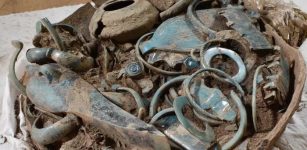 Hundreds Of Exceptional Bronze Age Artifacts Discovered In France Were Probably Offerings
Archaeology | Aug 28, 2021
Hundreds Of Exceptional Bronze Age Artifacts Discovered In France Were Probably Offerings
Archaeology | Aug 28, 2021 -
 Unexplained Ancient Wars In America – Knowledge Of Ancient High-Tech Weapons? – Part 1
Ancient Mysteries | Sep 29, 2020
Unexplained Ancient Wars In America – Knowledge Of Ancient High-Tech Weapons? – Part 1
Ancient Mysteries | Sep 29, 2020 -
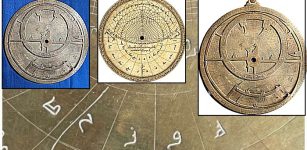 Rare Eleventh-Century Astrolabe Unearthed Recently Sheds Light On Islamic-Jewish Scientific Exchange
Scripts, Paintings & Inscriptions | Mar 4, 2024
Rare Eleventh-Century Astrolabe Unearthed Recently Sheds Light On Islamic-Jewish Scientific Exchange
Scripts, Paintings & Inscriptions | Mar 4, 2024 -
 Queen Marie Antoinette’s Silk Shoe Auctioned In Versailles
Artifacts | Nov 17, 2020
Queen Marie Antoinette’s Silk Shoe Auctioned In Versailles
Artifacts | Nov 17, 2020 -
 How Did People Go To The Toilet In The Past Before The Invention Of The Flush Toilet?
Archaeology | Jun 10, 2023
How Did People Go To The Toilet In The Past Before The Invention Of The Flush Toilet?
Archaeology | Jun 10, 2023 -
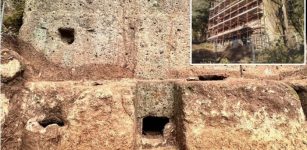 Who Is Buried In The Giant Etruscan Tomb At San Giuliano Necropolis?
Archaeology | Mar 13, 2024
Who Is Buried In The Giant Etruscan Tomb At San Giuliano Necropolis?
Archaeology | Mar 13, 2024 -
 8-Million-Year-Old Jaw May Offer Evidence Humans Evolved In Europe Instead Of Africa – Controversial Theory Suggests
Archaeology | Apr 24, 2019
8-Million-Year-Old Jaw May Offer Evidence Humans Evolved In Europe Instead Of Africa – Controversial Theory Suggests
Archaeology | Apr 24, 2019 -
 ‘Vandal’ Of Norwegian Viking Graves Identified But Charges Have Been Dropped!
Archaeology | Nov 9, 2020
‘Vandal’ Of Norwegian Viking Graves Identified But Charges Have Been Dropped!
Archaeology | Nov 9, 2020 -
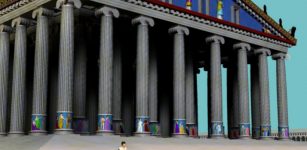 Herostratic Fame Relates To Herostratus Who Burned The Beautiful Temple Of Artemis To Become Famous
Ancient History Facts | Jan 6, 2017
Herostratic Fame Relates To Herostratus Who Burned The Beautiful Temple Of Artemis To Become Famous
Ancient History Facts | Jan 6, 2017 -
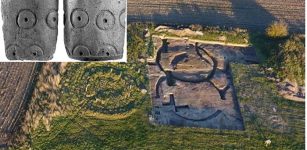 Dazzling Time Capsule Of Unique Iron Age Artifacts And Celtic Roundhouses Discovered In England
Archaeology | Mar 15, 2022
Dazzling Time Capsule Of Unique Iron Age Artifacts And Celtic Roundhouses Discovered In England
Archaeology | Mar 15, 2022 -
 Why Is Caganer, The Pooping Man Part Of The Catalonian Christmas Tradition And Nativity Scene?
Christmas Traditions | Dec 18, 2024
Why Is Caganer, The Pooping Man Part Of The Catalonian Christmas Tradition And Nativity Scene?
Christmas Traditions | Dec 18, 2024 -
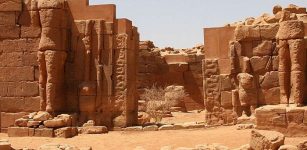 Kingdom Of Nubia: Pyramids And Priceless Secrets Of A Civilization Forgotten Long Time Ago
Civilizations | Feb 13, 2018
Kingdom Of Nubia: Pyramids And Priceless Secrets Of A Civilization Forgotten Long Time Ago
Civilizations | Feb 13, 2018 -
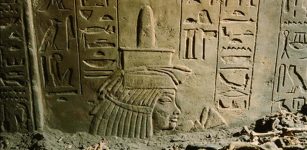 Tomb Of Maia, Tutankhamun’s Wet Nurse In Egypt’s Saqqara Opens To Public
Archaeology | Dec 22, 2015
Tomb Of Maia, Tutankhamun’s Wet Nurse In Egypt’s Saqqara Opens To Public
Archaeology | Dec 22, 2015 -
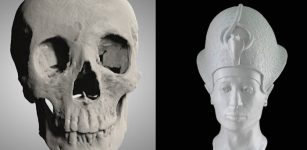 King Tut’s Face Reconstructed By Bioarchaeologist
Archaeology | Nov 26, 2022
King Tut’s Face Reconstructed By Bioarchaeologist
Archaeology | Nov 26, 2022 -
 Birch Bark Tar Production Techniques Offer Evidence Neanderthals Had Cognitive Skills Similar To Modern Thinking
Archaeology | Sep 26, 2023
Birch Bark Tar Production Techniques Offer Evidence Neanderthals Had Cognitive Skills Similar To Modern Thinking
Archaeology | Sep 26, 2023 -
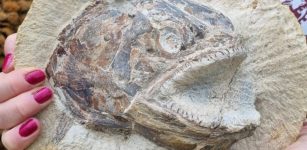 183-Million-Year-Old Fossils: Jurassic Marine World In A Farmer’s Field
Fossils | Jul 31, 2022
183-Million-Year-Old Fossils: Jurassic Marine World In A Farmer’s Field
Fossils | Jul 31, 2022 -
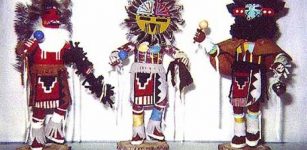 Astonishing Secrets Of Legendary Kachinas: Watchers Of The Hopi
Civilizations | Apr 8, 2017
Astonishing Secrets Of Legendary Kachinas: Watchers Of The Hopi
Civilizations | Apr 8, 2017 -
 Secret History Of The Micmac – The Mysterious Red Earth People
Ancient Mysteries | Jun 22, 2020
Secret History Of The Micmac – The Mysterious Red Earth People
Ancient Mysteries | Jun 22, 2020 -
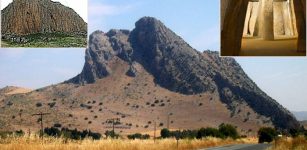 Mysterious Menga Dolmen: A New Very Old Monument Discovered
Archaeology | Sep 21, 2020
Mysterious Menga Dolmen: A New Very Old Monument Discovered
Archaeology | Sep 21, 2020 -
 Forseti: Norse God Of Justice And Lawmaker Who Lived In A Shining House
Featured Stories | May 1, 2016
Forseti: Norse God Of Justice And Lawmaker Who Lived In A Shining House
Featured Stories | May 1, 2016

